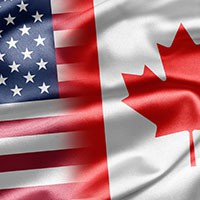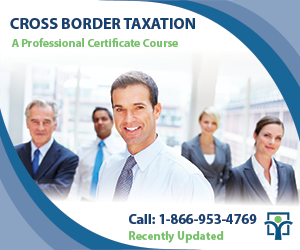
Cross-Border Taxation Issues after Election in U.S.
With the U.S. election results and the subsequent crash of the Canadian immigration site, now is likely a great time to brush up on the rules for cross-border taxation and for U.S citizens living in Canada. Knowledge Bureau covers the subject in its online Cross Border Taxation Course and will also devote a half day to the subject in the May edition of the Distinguished Advisor Workshops.
Knowledge Bureau’s Cross Border Taxation course, in the Tax Services Specialist – Distinguished Financial Advisor program, covers the latest information regarding new rules and regulations for those who live and invest stateside.
New information in the course includes:
- U.S. lifetime gift and estate exemption is increased to $5,450,000 in 2016.
- The Affordable Care Act in the U.S. requires individuals and families to have a required amount of health insurance coverage for the entire year or you may be penalized on your tax return; U.S. citizens living outside the U.S. are automatically assumed to have the appropriate coverage.
- The foreign earned income exclusion is $101,300 in 2016.
- The personal exemption amount is increased to $4,050 in 2016.
- The F.I.R.P.T.A. withholding tax rate will increase to 15% for sales closing after February 16, 2016, with a sale price exceeding $1,000,000; however, the 10% withholding rate will still apply if the proceeds are between $300,000 and $1,000,000 and the buyer is using the home as a principal residence.
The course also includes important information on lifetime gift and estate tax exemptions, updates to tax forms, temporary employment earnings, and much more.
Most chapters feature case studies which will ensure that the tax practitioner can adequately explain:
 |
- When Canada and the U.S. tax non-residents
- How Canadian and U.S. tax laws differ
- Filing requirements for U.S. citizens living in Canada and Canadians owning U.S. assets
- Benefits and protections of tax treaties
- How U.S. estate and gift tax apply to U.S. persons as well as non-residents
- What it means to become a non-resident of Canada or the U.S.
- How to enter the United States to work or live
- The tax consequences of terminating residence
- What is FATCA and how does it affect us?
For more information about Knowledge Bureau’s Cross Border taxation course, click here.
What Our Students Say:
“Excellent course. Well written, easy to understand and full of tremendous information. I would recommend this course to other financial planners.” Salpy B., ON
“This course is highly beneficial and covers a wide breadth of topics in sufficient depth. It assisted in developing my understanding of U.S. taxation as it pertains to cross-border tax situations. The knowledge and skills gained during this course increase the value I can add to our firm’s clientele when they have cross-border tax issues.” Dan M., ON
©2016 Knowledge Bureau Inc. All Rights Reserved.





